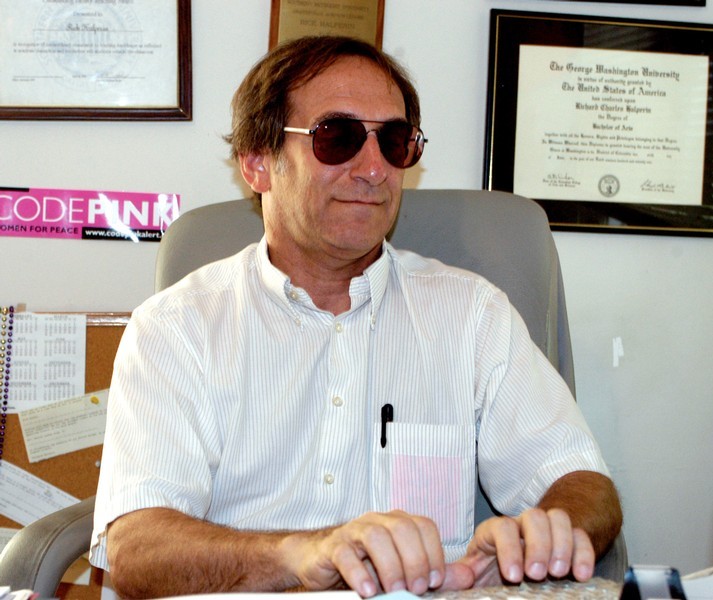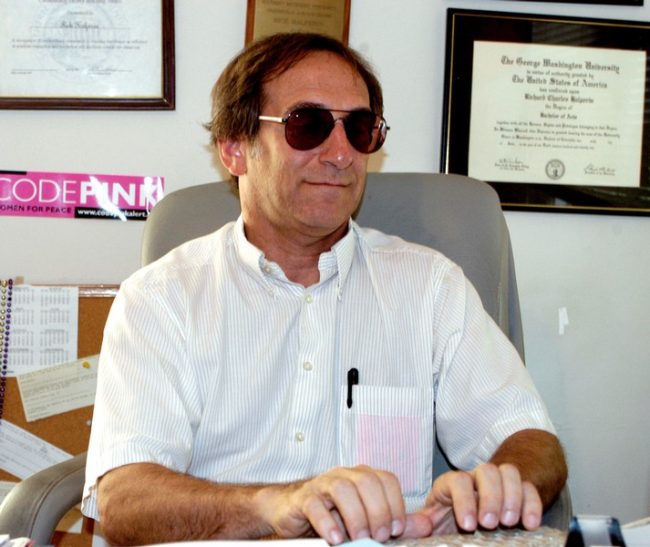
Halperin Elected to Chair Amnesty International (Photo by Austin Kilgore, The Daily Campus.)
Beyond the foot-high stacks of papers, binders and various artworks littering the floor of his office, Rick Halperin, an SMU history professor, sits behind his desk. A workaholic by nature, Halperin just finished teaching his third human rights course of the year, which he has been teaching four times a year (year-round) for several years. So it may come as no surprise that Halperin’s overriding life mission is to educate, but his ambitions extend even further.
“My agenda is to bring awareness, so if they [students] want to act, they will know that there are numerous outlets out there,” he said.
In creating awareness, Halperin channels his life’s calling in two directions: toward students in his human rights class and toward Amnesty International, a world organization devoted to the protection of human rights and criticizing those who violate them. In the past his position has required travel and research, some of which he uses in his classes.
A few weeks ago, his busy schedule became even busier when he was elected as chair of the Amnesty International USA Board of Directors. It’s not Halperin’s first time to serve in this high-profile position. He joined the organization in 1971 and served his first term from 1992 to 1993.
“It’s the type of job where you learn as you go,” he said. “There’s a benefit, having done it once, but it’s still a daunting challenge.”
“Virtually, it’s like being on call 24 hours a day,” he said. “I’m constantly making phone calls and answering e-mails about situations around the world, requests for help.”
Other than a plethora of e-mails and phone calls to tend to, Halperin’s duties now consist of working with the organization and its members to move policies forward, addressing domestic and global human rights concerns, doing community outreach, traveling and speaking. His first scheduled trip is this fall break, when he will travel to Switzerland to discuss Amnesty International’s status at the United Nations.
Though Halperin has been outspoken about human rights in general, he has been most outspoken on the death penalty, which he says he will treat as just a high profile of an issue as all other human rights violations.
“I’m going to be uncompromising in criticism of those entities, including the U.S., which commit human rights violations,” he said, speaking on par with Amnesty International’s most recent agenda.
As far as his goals for pushing human rights education, it’s at the top of his priorities.
“There’s no such thing as human rights education [in the United States],”he said. “And because of this, there’s no common ground for human rights in America, so it’s easy to pander to people’s views. It’s a great moral failure, a tremendous disservice by failing to present history and the continuum of human rights.”
Even with this much work on his plate, Halperin says he will continue to teach at SMU as most the traveling he’ll be doing will take place on the weekends.
“I don’t expect it to interfere with teaching, but I’ll have to see how the schedule unfolds,” he said.
Halperin is also involved with the SMU Amnesty International Chapter, which often sets up booths with petition and letter signings on behalf of foreign prisoners and later sends the missives to different diplomatic offices. Halperin says that oftentimes young people who sign Amnesty International letters concerning human rights violations abroad feel that their signature doesn’t make a difference. Time and time again, Halperin has said there have been several instances when SMU students have made a difference unknowingly by merely signing a letter. “I hope people will not be a bystander,” Halperin said, defining the word as someone who watches the great issues of life go by and merely comments on them. “And I hope students are asking not just ‘what am I going to major in?’ but ‘what am I here for?’” he said. “And then do something about it.”










